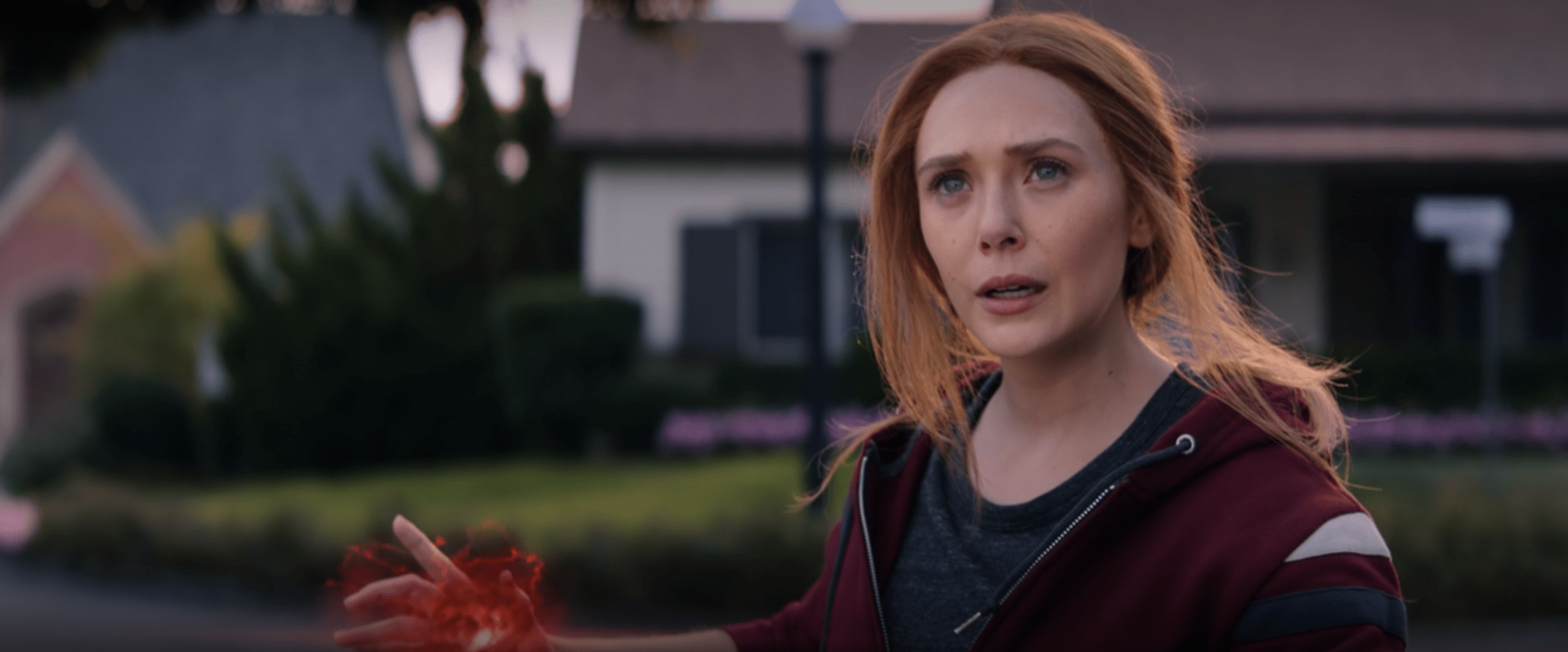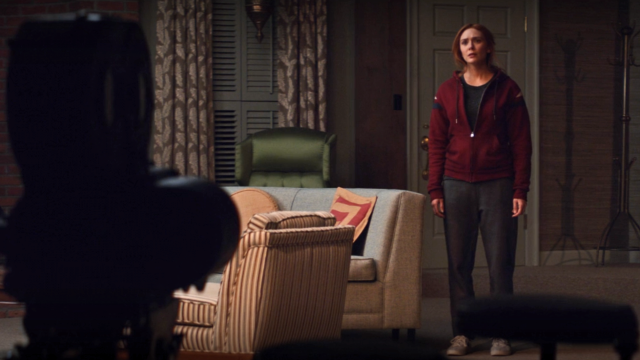The latest episode of WandaVision provided, with the little help of a magical handbrake, the chance that three-and-a-bit Avengers movies and a side of Captain America: Civil War failed to take: We finally learned what had made Wanda Maximoff who she is. But in Agatha Harkness, we learned something of ourselves in the process. Perhaps wanting to know it all is not always the best option.

As a TV show within the grand cultural behemoth that is the Marvel Cinematic Universe, WandaVision is no exception to the puzzlebox economy that fuels fandom discourse. As Wanda (Elizabeth Olsen) and Vision’s (Paul Bettany) televisual surreality has broken down bit by bit, the questions that have dominated the discussion around the show have been about how long it took for things to start connecting to the wider material.
[referenced id=”1675723″ url=”https://gizmodo.com.au/2021/02/wandavision-became-a-nightmarish-web-of-cathartic-reruns/” thumb=”https://gizmodo.com.au/wp-content/uploads/2021/02/27/n0fozbh6esilfwtompyw-e1614547047635-300×154.png” title=”WandaVision Became a Nightmarish Web of Cathartic Reruns” excerpt=”WandaVision’s first season transformed Marvel’s Wanda Maximoff (Elizabeth Olsen). She’s been a newlywed, a mother, and something far more fascinating and complex than all of her other new identities combined. It’s all been in service of its larger overarching story about the Avengers’ least understood hero who will presumably come…”]
We’ve looked to comics like sacred texts to wonder about whether or not the Disney+ series’ events laid the groundwork to retroactively retcon details we already know. Instead of seeing what it meant to these characters in the moment, we wondered if the presence of Evan Peters suddenly meant people would have to shuffle their Fox X-Men Blu-rays into their Marvel Studios shelf, as if re-organising the Great Library of Alexandria. Thrumming underneath all that was one question, loudest and most loaded of them of all: who’s the bad guy?
It turns out that maybe we are, for asking.

Well, actually no, let’s step back a bit first. Through the magic of what is already a hit contender for the 2021 song of the summer, it was revealed that Wanda’s eccentric neighbour Agnes was in fact Agatha Harkness, and potentially the manipulator of everything behind WandaVision’s scenes. A character from Marvel’s comics, Agatha provided a hook for fans — someone from the source material but also a figure to hang all their prior theorycraft on, vindication that weeks of wondering where it was all going had finally been given form. It was, after all, her all along. But “Previously On” reveals that, if anything, Agatha is much more like us than we may have thought: a curious onlooker to the events in Westview moreso than their architect.
Running through the latest episode’s 40-ish minute journey through Wanda’s life is the subtext that Agatha isn’t there to actually hear any of it, especially when Wanda’s recollections turn toward the emotional inflection points and moments of trauma that have defined her life. From the get-go, Agatha is revealed to us as a woman who, first and foremost, craves knowledge above anything else. Even putting aside her own origin story — betraying and murdering her own coven of witches, defying them to make a pact for some dark power beyond their own — there is both an eager compulsion and a sense of disdain as she drags Wanda through the story of her own life.

Kathryn Hahn doesn’t actually have much to do in “Previously On” — Agatha steps into Wanda’s shadow as our titular hero contemplates the moments of love and loss that culminated in an anguish-induced wave of chaos magic that created Westview and an approximation of the person she loved. But in that shadow, Agatha becomes like the audience, although played to comical extremes: a snarky comment when Wanda recalls the happiness of her young brother, a disdainful ask of wondering where it’s all going when Wanda remembers Vision coming to comfort her in the wake of Pietro’s death. She pokes and prods Wanda to put aside what she felt in these moments of her life, and asks her what might have caused them in the first place, pushing and pushing her to remember the magic that she has had in her all along.
It wasn’t luck that caused Tony Stark’s bombs to not blow you and your brother to smithereens, it was magic! Ignore what Hydra did to you, let’s talk Infinity Stones! Even at the very end, when Agatha thinks Wanda has finally gotten it, she sits alone as WandaVision’s empty audience — clapping as finally this woman has done what we’ve always wanted: realised that she is The Scarlet Witch, that there is a Big Bad to fight, and is ready to go.
The act of naming her in the final moments of the episode — the first time since Wanda’s introduction in Age of Ultron that she has been referred to by her superheroic identity from the comics — is Agatha’s expression of what she believes to be Wanda’s truth, and something more important than the woman’s own lived experiences. Wanda, exhausted and shaken by what she’s been forced to bring to the surface, just wants her kids and her husband back. “You’re supposed to be a myth,” Agatha mocks her, “a being capable of spontaneous creation. And here you are, using it to make breakfast for dinner.” She just wants the Scarlet Witch, to know what that is and what it means, instead of watching Wanda try to process the most tragic periods of her life. And is that not, in some ways, what audiences have been asking of her since WandaVision started?
[referenced id=”1675328″ url=”https://gizmodo.com.au/2021/02/kathryn-hahns-amazing-wandavision-faces-a-celebration/” thumb=”https://gizmodo.com.au/wp-content/uploads/2021/02/26/gnaixllafnfr1gejajtm-300×169.png” title=”Kathryn Hahn’s Amazing WandaVision Faces: A Celebration” excerpt=”There are a lot of things to love about Disney+ and Marvel’s WandaVision, but the top of the list has to be Kathryn Hahn as Agnes. The actor/national treasure has been stealing WandaVision’s shows-within-a-show long before last week’s not-so-secret reveal about who her character has been “all along.” Every time…”]
The relative underuse of Wanda as a character since Age of Ultron has been an ongoing thing in the Marvel Cinematic Universe — in part it’s why we got WandaVision in the first place, to explore who these characters are, Wanda in particular, beyond occasionally flinging trucks with red aftereffects and making doe eyes at a robot. That desire to give her and Vision alike a shared moment in the spotlight meant a chance to actually turn them into something more than supporting characters. Yes, to bring in elements of their lengthy comics histories as well, but primarily to make them actually feel like more than just their powersets.
“Previously On” feels like it jukes one way then, when we and Agatha alike expected it to juke another, trained by Marvel projects that wound up that way over and over. It doesn’t really have an ominous manipulator behind the scenes shaping its weirdness, no matter how many theories we’ve had about such a manipulator. For as much as it has borrowed iconography and names from the MCU and Marvel Comics at large, they have been more for Easter eggs than something the show has hung its entire plot on, even as we ourselves have looked to them as arcane scryings to ascertain importance and plot. We and Agatha are alike in this regard, in some unpleasant ways — chasing the connections and what they mean for the canon of this world more than we are connecting or empathizing with Wanda’s emotional arc.

This isn’t the first time superhero stories have played with metatextual fandom desires to have their favourite characters’ life stories compartmentalized and categorised for easier consumption, of course. From Mister Mxyzptlk and Bat-Mite to things closer to home like the X-Men villain Mojo, comics have long found ways to rib on fan expectations, in both adaptation and in continuity, and present it as an outside force for our heroes to confront and refute. Plus there’s one more episode to go that might reframe WandaVision’s “true” villain to something much more expected — as seems to potentially be the case with the set up to SWORD getting their hands on their own Cool Ranch Flavour Vision in the episode’s post-credits scene.
But there’s something fascinating in WandaVision potentially eschewing the expectations of the “it’s all connected” universe around itself to deliver a “Big Bad” that is more existential, that is more about deepening Wanda’s character than it is her on-screen bio and Rogue’s Gallery. Grief isn’t a concept Wanda and her husband can just energy-blast away the way they can a cackling witch or a sinister government stooge.
We spent eight weeks asking what the deal with WandaVision really was, and for now, we have an answer — it’s just not quite one we can easily slot onto a wiki page as we might have been hoping. All that’s left to see is if the show itself will follow that thesis through, or if chaos magic will truly reign.
